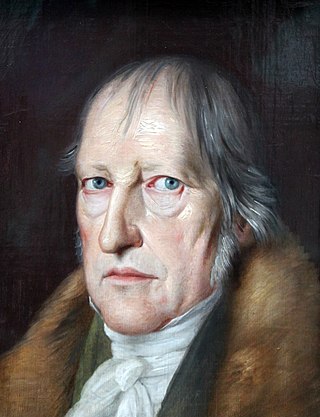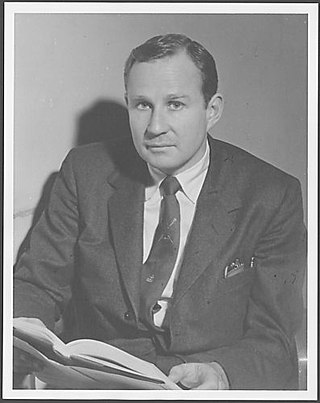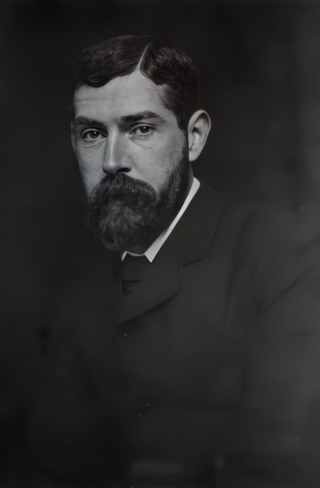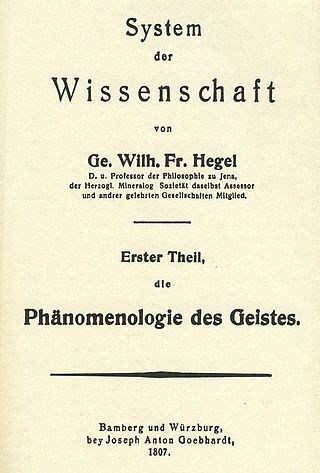Foundationalism concerns philosophical theories of knowledge resting upon non-inferential justified belief, or some secure foundation of certainty such as a conclusion inferred from a basis of sound premises. The main rival of the foundationalist theory of justification is the coherence theory of justification, whereby a body of knowledge, not requiring a secure foundation, can be established by the interlocking strength of its components, like a puzzle solved without prior certainty that each small region was solved correctly.

Georg Wilhelm Friedrich Hegel (1770–1831) was a German philosopher and one of the most influential figures of German idealism and 19th-century philosophy. His influence extends across the entire range of contemporary philosophical topics, from metaphysical issues in epistemology and ontology, to political philosophy, the philosophy of history, philosophy of art, philosophy of religion, and the history of philosophy.

Richard McKay Rorty was an American philosopher. Educated at the University of Chicago and Yale University, he had strong interests and training in both the history of philosophy and in contemporary analytic philosophy. Rorty's academic career included appointments as the Stuart Professor of Philosophy at Princeton University, Kenan Professor of Humanities at the University of Virginia, and Professor of Comparative literature at Stanford University. Among his most influential books are Philosophy and the Mirror of Nature (1979), Consequences of Pragmatism (1982), and Contingency, Irony, and Solidarity (1989).

John Henry McDowell is a South African philosopher, formerly a fellow of University College, Oxford, and now university professor at the University of Pittsburgh. Although he has written on metaphysics, epistemology, ancient philosophy, nature, and meta-ethics, McDowell's most influential work has been in the philosophy of mind and philosophy of language. McDowell was one of three recipients of the 2010 Andrew W. Mellon Foundation's Distinguished Achievement Award, and is a Fellow of both the American Academy of Arts & Sciences and the British Academy.

Wilfrid Stalker Sellars was an American philosopher and prominent developer of critical realism, who "revolutionized both the content and the method of philosophy in the United States".

Francis Herbert Bradley was a British idealist philosopher. His most important work was Appearance and Reality (1893).

The Phenomenology of Spirit is the most widely-discussed philosophical work of Georg Wilhelm Friedrich Hegel; its German title can be translated as either The Phenomenology of Spirit or The Phenomenology of Mind. Hegel described the work, published in 1807, as an "exposition of the coming to be of knowledge". This is explicated through a necessary self-origination and dissolution of "the various shapes of spirit as stations on the way through which spirit becomes pure knowledge".

In metaphysics, conceptualism is a theory that explains universality of particulars as conceptualized frameworks situated within the thinking mind. Intermediate between nominalism and realism, the conceptualist view approaches the metaphysical concept of universals from a perspective that denies their presence in particulars outside the mind's perception of them. Conceptualism is anti-realist about abstract objects, just like immanent realism is.
Contemporary philosophy is the present period in the history of Western philosophy beginning at the early 20th century with the increasing professionalization of the discipline and the rise of analytic and continental philosophy.
Inferential role semantics is an approach to the theory of meaning that identifies the meaning of an expression with its relationship to other expressions, in contradistinction to denotationalism, according to which denotations are the primary sort of meaning.

In late modern continental philosophy, neo-Kantianism was a revival of the 18th-century philosophy of Immanuel Kant. The neo-Kantians sought to develop and clarify Kant's theories, particularly his concept of the thing-in-itself and his moral philosophy.

The linguistic turn was a major development in Western philosophy during the early 20th century, the most important characteristic of which is the focusing of philosophy primarily on the relations between language, language users, and the world.
Neopragmatism, sometimes called post-Deweyan pragmatism, linguistic pragmatism, or analytic pragmatism, is the philosophical tradition that infers that the meaning of words is a result of how they are used, rather than the objects they represent.
Postanalytic philosophy describes a detachment from the mainstream philosophical movement of analytic philosophy, which is the predominant school of thought in English-speaking countries. The Internet Encyclopedia of Philosophy defines the movement as denoting "philosophers who owe much to Analytic philosophy but who think that they have made some significant departure from it." The movement cannot be unified into a single positive project as it is defined it terms of what it stands against, although it has generally been seen as bridging the gap between analytic and continental philosophy.

The lord–bondsman dialectic is a famous passage in Georg Wilhelm Friedrich Hegel's The Phenomenology of Spirit. It is widely considered a key element in Hegel's philosophical system, and it has heavily influenced many subsequent philosophers.

Richard Jacob Bernstein was an American philosopher who taught for many years at Haverford College and then at The New School for Social Research, where he was Vera List Professor of Philosophy. Bernstein wrote extensively about a broad array of issues and philosophical traditions including American pragmatism, neopragmatism, critical theory, deconstruction, social philosophy, political philosophy, and hermeneutics.
Nijaz Ibrulj is a Bosnian philosopher and a professor at the University of Sarajevo's Department of Philosophy and Sociology. He lectures on logic, analytic philosophy, methodology of social sciences, theory of knowledge, and cognitive science. His interests also extend to the field of social ontology. Ibrulj was awarded a Fulbright Visiting Scholarship during the 2000-2001 academic years to visit the University of California, Berkeley. His application was sponsored by John Searle and Donald Davidson.
Huw Price is an Australian philosopher, formerly the Bertrand Russell Professor in the Faculty of Philosophy, Cambridge, and a Fellow of Trinity College, Cambridge.
In logic, inference is the process of deriving logical conclusions from premises known or assumed to be true. In checking a logical inference for formal and material validity, the meaning of only its logical vocabulary and of both its logical and extra-logical vocabulary is considered, respectively.
Terry P. Pinkard is an American philosopher. He is a University Professor at Georgetown University. His research and teaching focus on the German tradition in philosophy from Kant to the present.











